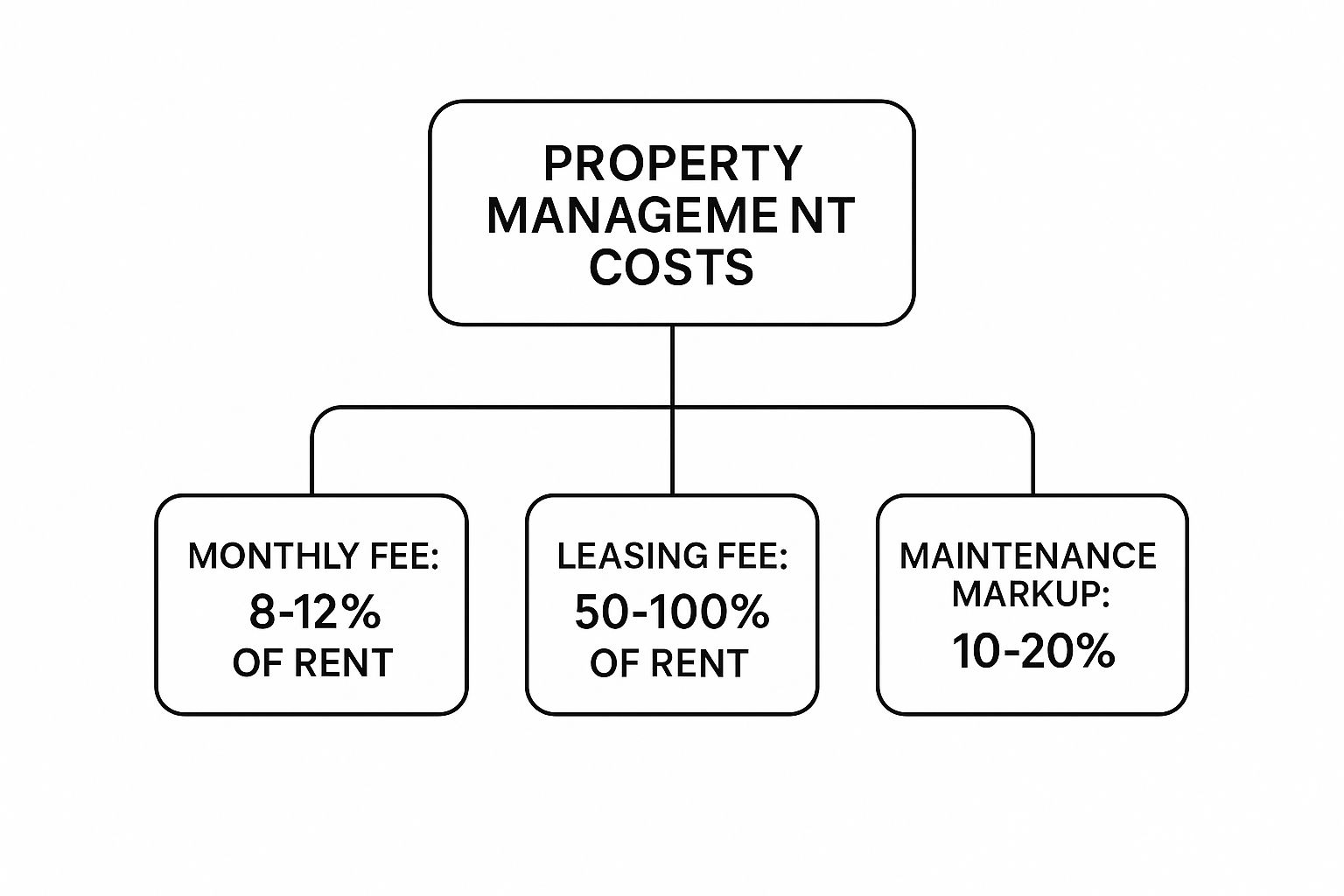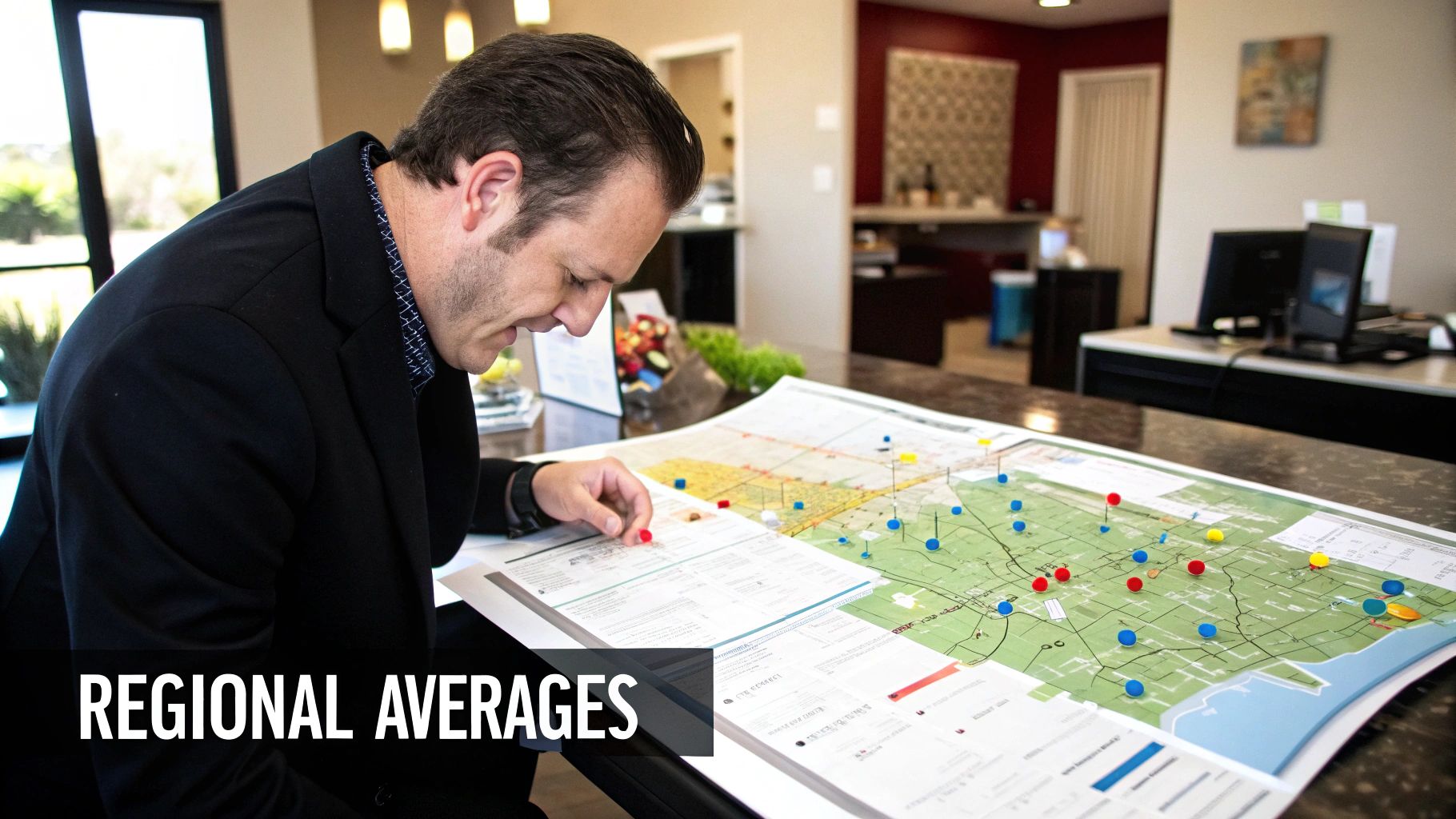Decoding Property Management Company Cost
- Sarah Porter

- Sep 10, 2025
- 14 min read
Updated: Sep 11, 2025
On average, you can expect the core cost of a property management company to be somewhere between 8% and 12% of the monthly rent they collect for you. But don't mistake that for the final number. Think of it as the base price before you add any options—other crucial services like leasing and maintenance come with their own costs.
Unpacking the Two Core Pricing Models
As you start looking into what a property management company will cost, you'll run into two main ways they structure their fees. Getting a handle on these is the first real step in figuring out your potential expenses and choosing a partner whose financial model works for you.
The two pricing structures you'll see almost everywhere are:
Percentage-Based Fee: This is the most common model. The management company takes a set percentage of the monthly rent collected.
Flat-Fee: You pay a fixed dollar amount every month, no matter what the rent is or if the property is even occupied.
An Analogy for Pricing Structures
It helps to think about it like different ways to get paid at a job. A percentage-based fee is like working on commission—your manager’s income is directly tied to your property’s performance (i.e., collecting rent). This can be a great motivator for them to keep your property filled.
A flat-fee model, on the other hand, is like a fixed salary. You pay the exact same amount every single month, which makes budgeting incredibly predictable. Each approach has its pros and cons, and the right one for you really depends on your property's specifics and how much risk you're comfortable with.
This breakdown shows some of the most common costs you'll come across.

As you can see, the recurring monthly management fee is just one piece of the puzzle. One-time costs like leasing fees and variable expenses for maintenance are standard practice across the industry.
This is a massive field, with the U.S. property management market projected to hit $81.52 billion by 2025. It's an industry powered by over 367,000 professionals, and these fee structures have become the standard for a reason—they cover the deep operational know-how and day-to-day work required to manage a property well. You can find more stats on the property management market on LLCBuddy.
Percentage Fee vs. Flat-Fee Pricing Models
To really understand the difference, let's put these two models side-by-side. The best choice often comes down to your rental price, local market conditions, and your personal preference for either variable or fixed expenses.
Feature | Percentage-Based Fee | Flat-Fee |
|---|---|---|
Calculation | A percentage (e.g., 10%) of the collected monthly rent. | A fixed dollar amount (e.g., $100) per month, per unit. |
Incentive | Aligns manager's success with yours; they earn more when rent is higher and the unit is occupied. | No direct financial incentive to maximize rent, but focused on providing a consistent service. |
Best For | Higher-end properties where maximizing rent is key; owners who want a "pay-for-performance" model. | Lower-rent properties where a percentage fee could be too low to secure quality service; owners who prioritize predictable monthly costs. |
Vacancy Impact | If no rent is collected, you typically pay no management fee. (Confirm this detail in your contract!) | You pay the fee whether the property is occupied or vacant. |
Budgeting | Monthly costs can fluctuate slightly as rent changes or during vacancies. | Extremely predictable; your management cost is the same every month. |
Ultimately, there's no single "best" model—only the one that's best for your specific investment strategy. A flat fee offers simplicity and predictability, while a percentage-based fee creates a powerful incentive for your manager to perform.
What's Actually Covered by Your Standard Management Fee?

When you see that monthly management fee—usually 8-12% of the rent—it's fair to ask, "What am I actually paying for?" The best way to think about this fee is as the operational cost for keeping your investment running smoothly. It covers all the essential, day-in-day-out tasks that make property ownership a source of income, not a source of stress.
This isn't just one charge for one thing. It's a comprehensive package of services that forms the backbone of professional property management. Knowing what's in that package is the key to understanding its value.
Day-to-Day Operations Management
A huge chunk of the management fee goes toward the daily grind—the hands-on work that saves you from dealing with late-night tenant calls and juggling endless administrative tasks.
This is what keeps the property ticking and includes things like:
Rent Collection and Processing: This is far more than just waiting for a check to arrive. It means setting up convenient online payment systems, actively tracking who has paid, and consistently enforcing late fees as outlined in the lease. They handle the money so you don't have to.
Tenant Communication and Relations: Your manager becomes the go-to person for your tenants. They're the ones fielding calls about a running toilet at 10 PM or handling a noise complaint, making sure residents feel taken care of so they'll want to stay.
Routine Maintenance Coordination: When a sink starts dripping or the AC goes out, the property manager gets the call. They then tap into their network of vetted, reliable vendors to schedule repairs, oversee the work, and make sure it’s done right—and at a fair price.
Financial and Administrative Oversight
Beyond the daily tenant-facing tasks, a critical part of the fee is dedicated to managing the financial and legal side of your property. This is where a great manager really earns their keep, protecting your asset from costly mistakes and giving you a clear view of its performance.
A good property manager doesn't just collect rent; they act as the chief financial officer for your real estate investment, providing the data and oversight needed to make smart decisions.
This behind-the-scenes work ensures everything is properly documented, tracked, and legally sound. Key services here include:
Detailed Financial Reporting: You should expect regular, easy-to-read financial statements. These reports clearly break down all income and expenses, showing you exactly how your investment is performing without you ever needing to create a spreadsheet.
Property Inspections: Most management agreements include periodic inspections—typically at move-in, move-out, and at least once a year. This helps catch small issues before they become big, expensive problems and ensures your property is being looked after.
Ensuring Legal Compliance: Landlord-tenant laws are complex and always changing. A professional manager stays on top of all local, state, and federal regulations, helping you avoid legal landmines related to fair housing, evictions, and safety standards.
Ultimately, that standard management fee is what transforms the demanding, full-time job of being a landlord into what you wanted in the first place: a well-run, passive investment.
Uncovering The Hidden Fees In Your Contract

The monthly management fee always gets the spotlight, but the real story of your total property management company cost is usually tucked away in the details. It's a lot like your mobile phone plan. The base monthly rate seems simple enough, but it's the extra charges for things like data overages or international calls that can really surprise you if you’re not paying close attention.
Many landlords get caught off guard by these "à la carte" fees that pop up outside the standard monthly percentage. They aren't necessarily deceptive tactics; they just cover specific, time-consuming events that fall outside the scope of routine management. Knowing what they are before you sign is the key to creating a realistic budget and avoiding nasty surprises down the road.
Breaking Down The Most Common Add-On Fees
Let's start with the big one: the tenant placement fee, which you'll also hear called a leasing fee. This is a one-time charge that covers the entire A-to-Z process of finding, vetting, and placing a new tenant in your property. It's a heavy lift that requires a ton of marketing, time, and legwork.
This fee is only charged when a new tenant signs on the dotted line, and it typically costs anywhere from 50% to 100% of the first month's rent. While that might sting a bit upfront, it's paying for a critical bundle of services that directly protects your investment:
Marketing Your Property: Getting professional photos, writing compelling listings, and advertising on all the major rental sites.
Conducting Showings: Fielding calls and emails, scheduling tours, and showing the property to prospective tenants.
Tenant Screening: This is huge. It includes running comprehensive background checks, pulling credit reports, and verifying employment and income.
Lease Preparation: Drafting and executing a rock-solid, legally compliant lease agreement.
A great property manager earns their keep during tenant placement. Getting the right tenant in your property can save you thousands in potential lost rent, property damage, and legal headaches. Think of the leasing fee as an investment in long-term peace of mind.
Maintenance is another area where extra costs can appear. While your manager handles the coordination of repairs, some companies will add a maintenance markup or a service coordination fee. This is often an additional 10-20% on top of the contractor's actual invoice and compensates the manager for the time spent finding vendors, scheduling the work, and making sure it gets done right. Always ask if this is part of their fee structure.
Preparing For The Unexpected Costs
Beyond finding tenants and fixing leaky faucets, a few other situational fees can show up on your monthly statement. These are tied to less frequent events, but it’s still smart to know they exist. How these are handled can vary, especially between different kinds of properties, and our **landlord's ultimate guide to managing single-family homes** has more specific advice on that front.
When you're reviewing a contract, it's wise to look for a breakdown of these à la carte services. Here's a table of common fees you might encounter.
Common Additional Property Management Service Fees
Fee Type | Common Cost Structure | Service Provided |
|---|---|---|
Lease Renewal Fee | $100 - $300 flat fee | Covers the time and paperwork needed to negotiate and sign a lease extension with a current, high-quality tenant. |
Eviction Fee | $200 - $500 flat fee (plus legal costs) | For handling the administrative side of the eviction process, from serving notices to coordinating with attorneys. |
Vacant Unit Fee | $50 - $100 per month | A fee charged when the property is empty to cover routine check-ins, answering inquiries, and basic oversight. |
Inspection Fee | $50 - $150 per inspection | For conducting detailed move-in, move-out, or annual property inspections beyond what's in the base contract. |
Bill Payment Fee | Small monthly flat fee or per-bill charge | An optional service where the manager pays recurring property bills like HOA dues, utilities, or mortgage payments for you. |
Knowing about these potential charges empowers you to read a management contract like a pro. You can move from being a passive client to an informed partner, ready to ask the right questions and secure a transparent agreement that truly works for you.
What Goes Into Your Management Quote?
You'll quickly find that property management quotes aren't pulled out of thin air. There's no standard, off-the-shelf price. Think of it more like a custom quote from a contractor; the final number depends entirely on the specific job at hand.
The quote for a sleek downtown condo will look worlds apart from one for a sprawling suburban house, and for good reason. Understanding the "why" behind the numbers helps you see the quote not just as a cost, but as a true reflection of the effort and expertise required to protect your asset.
Property Type and Condition
First and foremost, the property itself is the biggest variable. A multi-unit apartment building is a completely different beast than a single-family home. It means more tenants to manage, more common areas to maintain, and often, a higher rate of turnover. All that adds up to more work for the management company.
The age and condition of your property also play a massive role. An older building with quirky, original plumbing is naturally going to need more attention than a brand-new build. A good property manager prices in the likelihood of late-night emergency calls and more frequent maintenance requests.
At its core, a property manager's quote is a risk assessment. A well-maintained, single-tenant home is a pretty straightforward job, which usually means a more competitive fee. A multi-family building with high turnover? That’s a heavier operational lift, and the fee will reflect that.
Location and Market Dynamics
Where your property is located can change everything. A rental in a hot urban market might fetch a higher rent, but it also comes with a tangle of local regulations and fierce competition. On the other hand, a property in a more rural spot might sit vacant longer, demanding a much more robust marketing strategy to find the right tenant.
The health of the local market also plays a huge role. Look at the bigger picture: the European property management market is valued at over USD 8 billion, showing just how much regional trends can shape pricing. Zooming in, the UK's market hit around USD 1.35 billion in 2025 thanks to a real estate boom, while Germany's market grew to USD 1.6 billion as companies adopted new tech. These stats show how everything from economic growth to local tech trends impacts a manager's operating costs—and, in turn, your quote. You can dig deeper into the numbers by checking out the global property management landscape on Cognitive Market Research.
Level of Service
Finally, what do you actually need them to do? The level of service you choose will directly dial your fee up or down. A bare-bones package that just covers rent collection and leasing will obviously cost less than a full-service, hands-off agreement.
If you want your manager to handle everything—from paying the HOA dues and property taxes to providing detailed financial reports and being on call 24/7 for emergencies—you're paying for peace of mind. The more you hand off, the more the service will cost, but it also frees you up completely.
Calculating the True Return on Your Investment

Seasoned investors learn to look at their numbers from different angles. Instead of seeing the property management company cost as just another line-item expense, it’s much smarter to think of it as an investment. The real question isn't, "What does it cost?" but rather, "What's my return?"
That monthly fee is only one piece of the puzzle. The true value comes from adding up the real financial gains and subtracting the costly mistakes you sidestep by having a professional running the show. This is about so much more than just collecting rent.
Moving Beyond the Monthly Fee
A good property manager actively works to make your property more profitable. Think about it: their expertise in marketing and tenant screening directly chips away at your vacancy loss. If they can fill your property just one month faster each year, that extra rent often covers a huge chunk of their annual management fee right there.
This kind of efficiency is where they really shine. A manager’s rigorous screening process also brings in better tenants—the kind who pay their rent on time, treat the property with respect, and stick around longer. This dramatically reduces your turnover costs, which are a nasty combination of lost rent, deep cleaning expenses, and repairs between tenants.
The Financial Upside of Professional Oversight
Maintenance is another area where you'll see a big financial win. Property managers have a roster of trusted, insured vendors they work with regularly. This relationship often gets them preferred pricing that a solo landlord simply can't access. It stops you from getting overcharged for repairs and ensures the job is done right the first time.
Let's look at a quick, realistic example:
A DIY landlord might easily lose $2,000 in rent from a two-month vacancy.
They might also overpay by $500 for an emergency plumbing repair by hiring the first person they find online.
That's $2,500 gone. For that same property, a 10% management fee might only come out to $2,400 for the entire year. Just by preventing those two common blunders, the manager has already paid for themselves.
The real return on investment isn't just about the money you make; it’s about the money you don't lose. A great manager protects your bottom line by preventing costly vacancies, tenant damages, and overpriced repairs.
There's a reason this industry is booming. The global property management market is expected to hit around USD 38.48 billion by 2034. This growth is being driven by the undeniable value managers bring in handling high operational costs like maintenance, insurance, and legal compliance—all things that can quickly eat away at a solo landlord's profits. You can dive deeper into the growing property management market on Precedence Research.
The Priceless Non-Financial Returns
Finally, you can’t put a price tag on every return. What is the value of getting your time and mental energy back? Handing off the late-night emergency calls, the stressful tenant disputes, and the endless administrative tasks lets you focus on what matters—your career, your family, or finding that next great investment. To get a better sense of your specific numbers, check out our guide on how to use a property management cost calculator for rental owners.
That freedom is the ultimate ROI. It's what turns your rental property from a demanding second job into a genuinely passive, scalable investment.
How to Choose a Cost-Effective Property Manager
Now that you have a solid handle on what property management can cost, it's time to shift your thinking from price to value. Finding a cost-effective manager isn't about chasing the lowest bid. It’s about finding a partner who will deliver the best return on your investment.
Think about it: the cheapest option often comes with hidden costs. They might cut corners on tenant screening or skimp on maintenance, leading to expensive evictions or repairs down the road. The goal is to find a company whose fees make sense for your specific property and whose service genuinely protects your asset.
Asking the Right Questions
Before you even think about signing a contract, you need to do some digging. A transparent, confident company will have no problem answering detailed questions. If you sense hesitation, consider it a red flag. A frank conversation upfront can save you a world of headaches later.
Here are the key things you need to nail down:
Full Fee Breakdown: Ask for a complete schedule of every single potential fee. How much is the tenant placement fee? Is there a lease renewal fee? Do they add a markup on maintenance and repair invoices?
Contract Terms: What does it take to get out of the contract? Be sure to ask about early termination penalties.
Tenant Screening Deep Dive: Don't just accept "we screen tenants." Ask what their process looks like step-by-step. This should include credit checks, criminal background verification, and calling previous landlords.
You can tell a lot about a property manager by their processes. A thorough, well-defined tenant screening system is one of the clearest signs you're dealing with a professional who will protect your cash flow.
Verifying Their Track Record and Communication Style
A slick presentation is one thing, but on-the-ground performance is what really counts. Don't just take their word for it—ask for references from both current and past clients. This is the best way to get an unfiltered look at what it's truly like to work with them.
You also need to set clear communication expectations from the get-go. How often will you get financial statements? Who is your direct point of contact when you have a question? Good, consistent communication is just as valuable as a competitive property management company cost.
For a more comprehensive checklist, check out our essential guide to hiring a property manager.
Frequently Asked Questions About Property Management Costs
Working through the fine print of a property management contract always brings up a few questions. Let's tackle some of the most common ones landlords ask when they're figuring out the true cost of hiring a pro.
Is a Lower Property Management Fee Always Better?
It’s tempting to jump at the lowest number, but a rock-bottom monthly fee can sometimes be a red flag. Think of it like a budget airline—the initial ticket price looks great, but you end up paying extra for everything from seat selection to carry-on bags.
An unusually low fee might mean you're getting bare-bones service or that you'll be hit with a dozen "à la carte" charges later. A reputable company with a slightly higher, more inclusive fee often delivers a better overall return by keeping tenants happy, minimizing vacancies, and protecting your asset. Always look at the total value, not just the sticker price.
Can I Negotiate Property Management Fees?
Absolutely. There's often some wiggle room, especially if you're bringing multiple properties to the table. While the core management percentage might be set in stone, other fees are frequently negotiable.
Pro Tip: Your best bet is to focus on the secondary charges. You might have more luck asking for a reduction in the tenant placement fee, a lower lease renewal fee, or more favorable terms for ending your contract early. It never hurts to ask.
Do I Pay Management Fees If My Property Is Vacant?
This is a critical question, and the answer comes down to what's in your agreement. Some management companies will waive their monthly fee during a vacancy, which is a fantastic incentive for them to fill your property as quickly as humanly possible.
Others might charge a reduced flat fee to cover their time for showings and marketing, while some continue to charge the full percentage based on the "projected" rent. Before you sign anything, make sure you know exactly how vacancies are handled so there are no surprises when the property is empty.
At Keshman Property Management, we believe in total transparency. Our pricing is designed to be straightforward, with no hidden fees, so you can see exactly how we help you maximize your investment. Find out more about our services designed for landlords at https://mypropertymanaged.com.

Comments